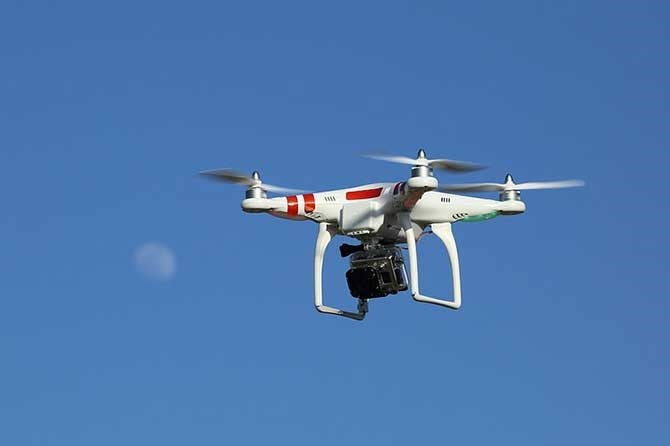
Image Credit: wikimedia commons
August 21, 2023 - 7:30 AM
Drones haven't only been a problem for fire personnel on Okanagan fires, in the last month there have been three reported sightings of drone aircraft within Kelowna International Airport’s airspace.
“We have a drone exclusion zone which is about 5.6 km around the airport so, if there is a sighting of a drone within that area, we initiate our safety responses and work with the RCMP with their investigation as it poses a safety threat to incoming and outgoing aircraft and public safety,” Shayne Dyrdal, acting CEO for the airport told iNFOnews.ca.
That 5.6 km zone ranges from Duck Lake in the north, Sexsmith Road in the south, Glenmore Road in the west and past Old Vernon Road to the east.
Dyrdal was aware of sightings on July 27 and Aug. 3 but not about one reported Aug. 16.
That one, according to the Civil Aviation Daily Occurrence Reporting System, was spotted on Aug. 8 by Central Mountain Air hovering at 4,200 feet (the airport elevation is about 1,421 feet).
No further details were available on any of the incidents.
“Proactively, what we have tried to do is provide education so people are aware that a drone is a remotely piloted aircraft so, when you are operating a drone, you are a pilot and you have to adhere to the Transport Canada regulations in the area,” Dyrdal said.
READ MORE: Drones, ATVs hamper B.C.'s wildfire fighting efforts during record-breaking season
Everyone flying a drone weighing between 250 grams and 25 kg has to have a drone pilot’s certificate.
There is a basic certificate but an advanced licence is required for things like flying over people, into a controlled airspace or within three nautical miles of an airport, according to Transport Canada regulations.
To get a basic licence, pilots have to pass an online test but it’s recommended they also attend drone flight schools.
To get the more advanced certificates, pilots also have to pass flight reviews and achieve certain grades on their exams.
Go here for more information.
Fines start at $1,000 for individuals flying without a certificate and $3,000 for “putting aircraft and people at risk,” which includes flying into an airport’s airspace.
Fines start at $5,000 for corporations and rise to $15,000 for putting aircraft and people at risk.
The Transport Canada website outlining penalties also says jail time is possible but doesn’t specify what those sentences are.
“The rules and regulations have been in place since 2019 so, when someone is the owner of a remotely operated aircraft, also known as a drone, they need to be aware of the rules before they fly it,” Dyrdal noted.
For more information on safely operating drones, go here.
To contact a reporter for this story, email Rob Munro or call 250-808-0143 or email the editor. You can also submit photos, videos or news tips to the newsroom and be entered to win a monthly prize draw.
We welcome your comments and opinions on our stories but play nice. We won't censor or delete comments unless they contain off-topic statements or links, unnecessary vulgarity, false facts, spam or obviously fake profiles. If you have any concerns about what you see in comments, email the editor in the link above. SUBSCRIBE to our awesome newsletter here.
News from © iNFOnews, 2023